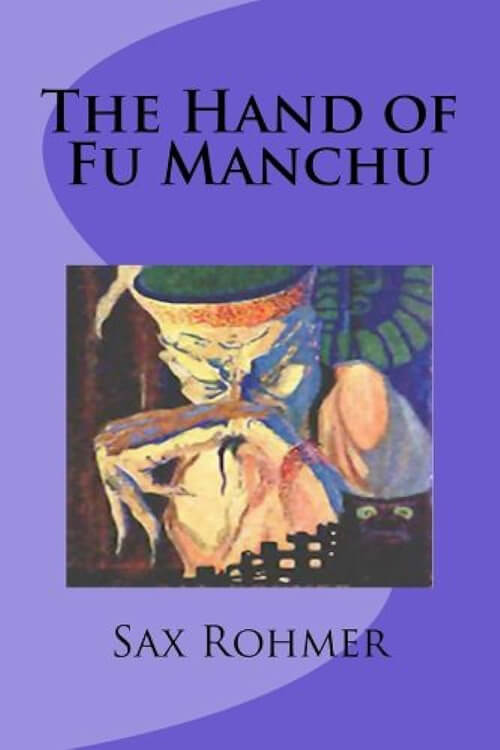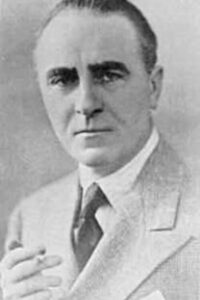
The Hand of Fu-Manchu
“Who’s there?” I called sharply.
I turned and looked across the room. The window had been widely opened when I entered, and a faint fog haze hung in the apartment, seeming to veil the light of the shaded lamp. I watched the closed door intently, expecting every moment to see the knob turn. But nothing happened.
“Who’s there?” I cried again, and, crossing the room, I threw open the door.
The long corridor, lighted only by one inhospitable lamp at a remote end, was choked and yellowed with this same fog so characteristic of London in November. But nothing moved to the right or left of me. The New Louvre Hotel was in some respects yet incomplete, and the long passage in which I stood, despite its marble facings, had no air of comfort or good cheer; palatial it was, but inhospitable.
I returned to the room, closing the door behind me. For some five minutes or more, I stood listening for a repetition of that mysterious sound, as of something that both dragged and tapped, which already had arrested my attention. My vigilance went unrewarded. I had closed the window to exclude the yellow mist, but subconsciously, I was aware of its encircling presence, walling me in. Now I found myself in such a silence as I had known in deserts but could scarcely have deemed possible in fog-bound London, in the heart of the world’s metropolis, with the traffic of the Strand below me upon one side and the restless life of the river upon the other.
It was easy to conclude that I had been mistaken, that my nervous system was somewhat overwrought as a result of my hurried return from Cairo—from Cairo where I had left behind me many fondly cherished hopes. I addressed myself again to the task of unpacking my steamer trunk and was so engaged when, again, a sound in the corridor outside brought me upright with a jerk.
A quick footstep approached the door, and a muffled rapping came upon the panel.
Read or download Book
Sax Rohmer
Arthur Henry “Sarsfield” Ward (15 February 1883 – 1 June 1959), better known as Sax Rohmer, was an English novelist. He is best remembered for his series of novels featuring the master criminal Fu Manchu.
Biography.
Born in Birmingham to working-class Irish parents William Ward (c. 1850–1932), a clerk, and Margaret Mary (1850–1901), Arthur Ward initially pursued a career as a civil servant before concentrating on writing full-time. He was a poet, songwriter, and comedy sketch writer for music hall performers before creating the Sax Rohmer persona and pursuing a career writing fiction.
Like his contemporaries Algernon Blackwood and Arthur Machen, Rohmer claimed membership in one of the factions of the Hermetic Order of the Golden Dawn and tied it to the Rosicrucians, but the validity of his claims has been questioned. His doctor and family friend, Dr R. Watson Councell, may have been his only legitimate connection to such organisations.
His first published work was issued in 1903 when the short story “The Mysterious Mummy” was sold to Pearson’s Weekly. Rohmer’s main literary influences are Edgar Allan Poe, Arthur Conan Doyle, and M. P. Shiel. He gradually transitioned from writing for music hall performers to concentrating on short stories and serials for magazine publication. In 1909, he married Rose Elizabeth Knox. He published his first book, Pause! Anonymously in 1910. In 1934, Sax Rohmer moved into a newly refurbished house, Little Gatton, on Gatton Road, Reigate, Surrey, where he lived until 1946. He died after succumbing to Asian flu in 1959.
After penning Little Tich in 1911 (as a ghostwriter for the music hall entertainer of the same name), he wrote the first Fu Manchu novel, The Mystery of Dr. Fu-Manchu, first published in a serialization from October 1912 to June 1913. It was an immediate success, with its story of Denis Nayland Smith and Dr. Petrie facing the supposed worldwide conspiracy of the “Yellow Peril”. The Fu Manchu stories, together with his more conventional detective series characters — Paul Harley, Gaston Max, Red Kerry, Morris Klaw (an occult detective), and the Crime Magnet — made Rohmer one of the most successful and financially well-off authors of the 1920s and 1930s.
The first three Fu Manchu books were published in the four years between 1913 and 1917, but it was not until 1931 (some 14 years after the third book in the series) that Rohmer returned to the series with Daughter of Fu Manchu. The long interval was because Rohmer wanted to be rid of the series after The Si-Fan Mysteries. Stoll had successfully filmed the first three books in the twenties as a pair of serials.
Rohmer’s first effort at reviving the Fu Manchu property was ultimately reworked as The Emperor of America. The original intent had been for the head of the organization to be Fu Manchu’s daughter. He kept Head Centre as a female criminal mastermind to combat Drake Roscoe but was very unhappy with the book as it started and in its finished form. He would later return to Drake Roscoe and his female supervillain for the Sumuru series. In the meantime, he tried again to focus his energies on what was first titled Fu Manchu’s Daughter for Collier’s in 1930, but with an older (now knighted) Denis Nayland Smith as the protagonist once more. The results were infinitely better, and the series was jump-started.
In the 28 years from 1931 to 1959, Rohmer added ten books to the Fu Manchu series, meaning the series totals 13 books in all (not counting the posthumous short story collection The Wrath of Fu Manchu and Other Stories). The Fu Manchu series was criticized by the Chinese government and Chinese communities in the U.S. for what was perceived as negative ethnic stereotyping. Sociologist Virginia Berridge has stated that Rohmer created a false image of London’s Chinese community as crime-ridden, further claiming that the Limehouse Chinese were one of the most law-abiding of London’s ethnic minorities. Critic Jack Adrian has written: “Rohmer’s racism was careless and casual, a mere symptom of his times”. Colin Watson commented: “So vehement and repetitive were Sax Rohmer’s references to Asiatic plotting against ‘white’ civilization that they cannot be explained simply as the frills of melodramatic narration.”






